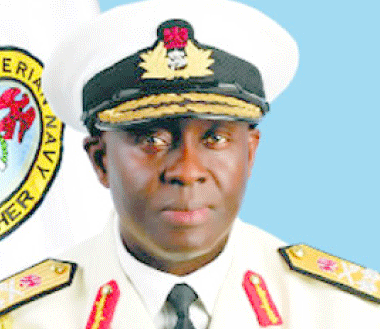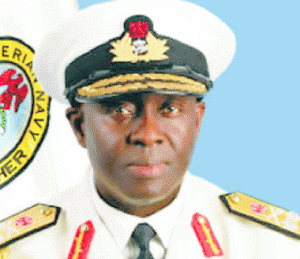


By Dianabasi Effiong
Naval chiefs from no fewer than 10 African countries; the US; the UK; and other collaborating nations met recently at Tinapa Resort, Calabar, to strategies on ways to ensure a safe and secure maritime environment in the Gulf of Guinea (GOG).
According to Vice Adm. Dele Ezeoba, Nigeria’s Chief of Naval Staff, the meeting was essentially convened to address challenges and threat to the economic interest of states in the GOG against the background of GOG’s strategic location.
He stated there was the need to collaborate on the security of the region. According to him, the theme for the first Regional Maritime Awareness Capability Conference (RMACC) in Calabar: “Regional maritime awareness capability systems: A key for enhancing maritime security in the Gulf of Guinea’’ aptly captured those concerns.
Ezeoba said the GOG has become a source of concern to the region and the international community given its numerous security challenges.
He said the threats on regional security included piracy, sea robbery, drug and human trafficking, pipeline vandalism; and crude oil theft.
Ezeoba also listed illegal, unregulated and unreported (IUU) fishing, proliferation of small arms and light weapons and environmental degradation as sources of threat in the GOG..
“Regrettably, these threats constitute serious challenges and adversely impact on the collective maritime governance imperatives and economic wellbeing of nation states in the GOG. It is therefore imperative to emphasise that no meaningful development can take place in an atmosphere of insecurity within the global community. As discomforting as these threats would appear, they are not insurmountable hence the clarion call for the enthronement of constructive, proactive, sustainable and holistic maritime security architecture.
“Such structure would ensure a secure and safe maritime environment for optimal exploration and exploitation of the abundant maritime resources. These resources are germane for socioeconomic growth and national development of sub-Saharan Africa while providing economic opportunities for the rest of the world”, Ezeoba said.
He also suggested a way out: “An effective maritime security regime in the GOG must be pitched on core attributes such as the elimination of sea blindness within the African continent, sincerity of purpose, strength of character and above all, the political will of all member-states and stakeholders”.
He said that member-states should also put in place “the requisite synergy for optimal utilisation of the RMACC in information and intelligence sharing, situational awareness and collaborative planning.
The Minister of State Defence, Dr Olusola Obada, (dropped in a recent cabinet reschuffle by Nigeria’s president Goodluck Jonathan) who also addressed the meeting enjoined the GOG states to “come together to effectively patrol their Exclusive Economic Zones (EE)], territorial waters, and ports.
She said: “The losses translate into huge opportunity cost in terms of both unrealizes national revenue and untapped human potentials. RMACC has become the sure way for Nigerians to enforce maritime governance and prevent illegal activities from occurring in her maritime domain”.
She listed the security lapses in the GOG to include lack of basic maritime awareness which creates ungoverned maritime environment which allows terrorists and criminals to freely move and operate.
She said that other lapses are: “inadequate national and regional capabilities to monitor maritime surface traffic in a timely manner and lack of policies, tactics, techniques and procedures and training on the security of the region”.
Similarly, Rear Adm. Joe Aikhomu, the Flag Officer Commanding Eastern Naval Command, disclosed that the RMACC was introduced with the assistance of the US and UK.
He said that RMACC “presented opportunities which if carefully managed will facilitate tremendous improvement in the security of the GOG”. He said that the Nigerian Navy is determined to continually provide “a holistic, operational framework anchored on surveillance, response initiative and enforcement” in Nigeria’s maritime domain.
Aikhomu said these actions were “pivotal variables for effective maritime security”.
“Accordingly the Nigeria Navy is taking the lead in increasing existing regional maritime Domain Capability through surveillance systems located along Nigeria’s coastline in order to improve total awareness of the environment”.
“This effort has already started yielding tangible results with the arrest of over 40 vessels engaged in illegal activities in our water. How to extend this coverage to the entire Gulf of Guinea, through collaboration of other member states, is what this conference is set to address”, he said.
Papers were presented on topics ranging from “Enhancing patrols by GOG Nations Using Surveillance Technology; Human Capacity Development for African RMAC; Exploring Surveillance Technology in addressing Africa’s Maritime Security problem” to “Global Maritime Distress and Safety System as an Essential Tool for Maritime Safety: Issues and Prospects.
Participants were also briefed on regional maritime awareness information sharing and regional capacity building and Nigeria as prime trainer for the GOG nations.
Gov. Liyel Imoke of Cross River, who also addressed the RMACC, said that the world economy might lose more than $950m in 2013 as a result of piracy in the GOG
Imoke, who cited a study published by Industry Alliance, said that it is also estimated that total insurance cost for the insecurity in the GOG was between $423 m to $437 m in 2012.
“It is estimated that piracy in the Gulf of Guinea cost the world economy between $740m and $950m last year and that figure is expected to increase in 2013. The economic implication of this insecurity presents a stark realisation of the gravity of the situation.
According to the governor, insecurity in the region’s maritime domain was traceable to “proliferation of low-intensity resource induced attacks mostly led by criminal gangs, warlords and other non-state actors”.
He, however, said that he was hopeful that deliberations by the naval chiefs from the GOG states and other international stakeholders would further assess the situation and initiate plans to address the challenge within the maritime context.
Some of the highlights of the 3-day conference include the berthing of the Nigeria Navy Ship (NNS) THUNDER in Calabar Port to participate in the RMACC.
A Communiqué which encapsulated the discussions and resolutions issued by Heads of Navies and Coast Guards of the GOG resolved to institute effective legal regime for maritime law enforcement in the region.
It also called for collaboration for development of capability for effective response and capacity for maritime domain awareness coverage within individual and common sea areas of member GOG states.
The communiqué, read on their behalf by Rear-Adm. Raphael Osondu, the Director of Plans, Naval headquarters, Abuja, also called for the establishment and activation of a common maritime information sharing mechanism through the establishment of Inter-Regional Coordination Centre by March 2014.
It also expressed the will to facilitate the designation and establishment of national focal points of contact for information sharing on maritime domain awareness in each member states of GOG by December 2013.
The naval chiefs and their representatives also stated the will to initiate the integration of maritime domain awareness efforts “through equipment and procedural interoperability by December 2013”.
The communiqué also resolved to establish centres of excellence on capacity building for maritime domain awareness in the Gulf of Guinea.
“In line with the foregoing, we the undersigned express the will to: develop basic capability for maritime domain awareness in each member state. Conduct combined annual exercises among navies and coast guards in the GOG.
“We also resolved to invite regional bodies, regional mechanisms, friendly navies and other stakeholders to partner with the GOG navies and coast guards in their desire to improve maritime domain awareness capacity and response capability among the GOG states and sustain the RMACC annually”, it stated.
The communiqué was endorsed by naval chiefs of Angola; Cameroun; Cote D’Ivoire; Equatorial Guinea; Ghana; Gabon; Nigeria; Senegal; Togo; and Sao-Tome and Principe.
Ezeoba, who spoke before the communiqué was issued, urged signatories to the agreement to be committed in its implementation.
“In the past, there had been the penchant for people to walk away after such talk shops, but in this case we have agreed through our endorsement to implement the agreement”, he said.







